© Ru Jia 2017 All rights reserved.
LIBRARY CIRCLE
Find a satisfactory seat or service for various learning purpose is hard for library users. At the same time, Hatcher-Shapiro Library in University of Michigan also faced challenges of shifting a traditionally collections-centric building to a services-centric space.
We designed a mobile application to reduce physical, digital and operational barriers to internal awareness, collaboration and communications.
Date
Oct 2016
Apr 2017
Team:
Ru Jia & Will Wang
Mentor: Emily Puckett Rodgers
Responsibility
User Research, Prototyping, Usability Testing
Background
The Hatcher-Shapiro Library is at the center of the campus and a node in a network of libraries. With the rise of digital information, the library is facing challenges of shifting from a collection-centric to service-centric organization. It continually reinventing itself as the platform that enable teaching, learning, healing, invention and creative expression.
Process

Problems
- Hard to listen directly from users
- Hard to manifest its role as a service-centric places
- Hard to facilitate collaboration and communication within opaque old building
From Library's Perspective
- Hard to find space or seats that fit vairous study purpose
- Hard to navigate through the building
- Hard to find resources for academic exploration and creation
From User's Perspective
Design Overview
1. Explore Library
Showroom of Library's Spaces and Services
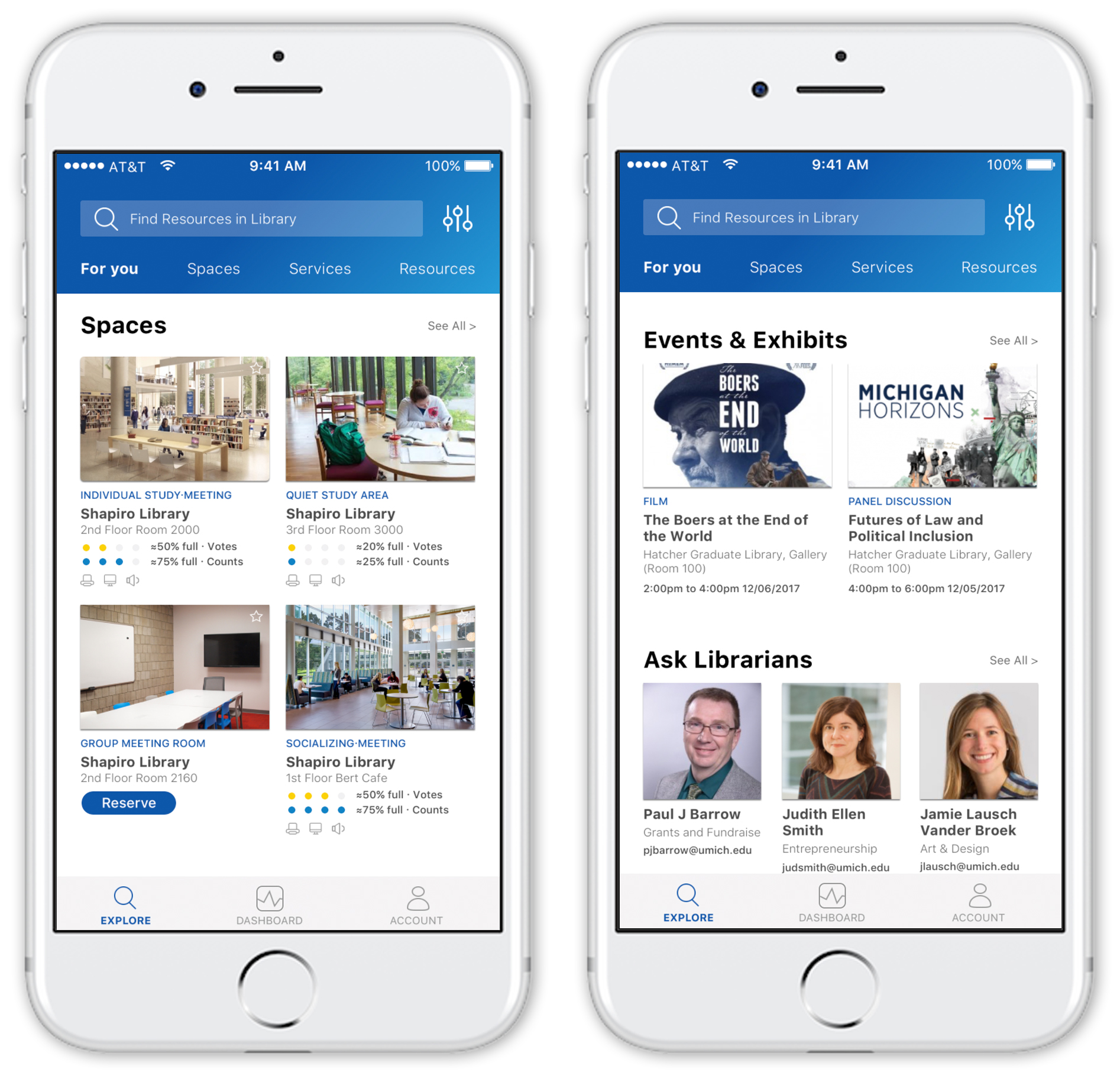
2. Filter Space
Find available seats that fit study purpose

3. Dashboard
Increase internal awareness of library service

4. Voting System
Facilitate engagement by contribution

Research
Understanding Library Service
We conducted a lengthy library service research that included
- Library service walk through
- Staff interviews
- Library way finding case studies and competetive analysis
Insight 1. Foundamental Goals of Services

The library services need to significantly influence how users discover, explore, create and share human knowledage.
Insight 2. Service Type and User Journey

Understanding Users
We conducted user research to understand how users use library space and services to reach their academic goals.
Test how digital information influence users' behaviors
Space Filters
Users have various preferences on the spaces in which they choose to work. We found that many tools like Spacefinder allow users to find the desired space by filtering space information. However, what information should be included in our case and how users use these information remained unknown.
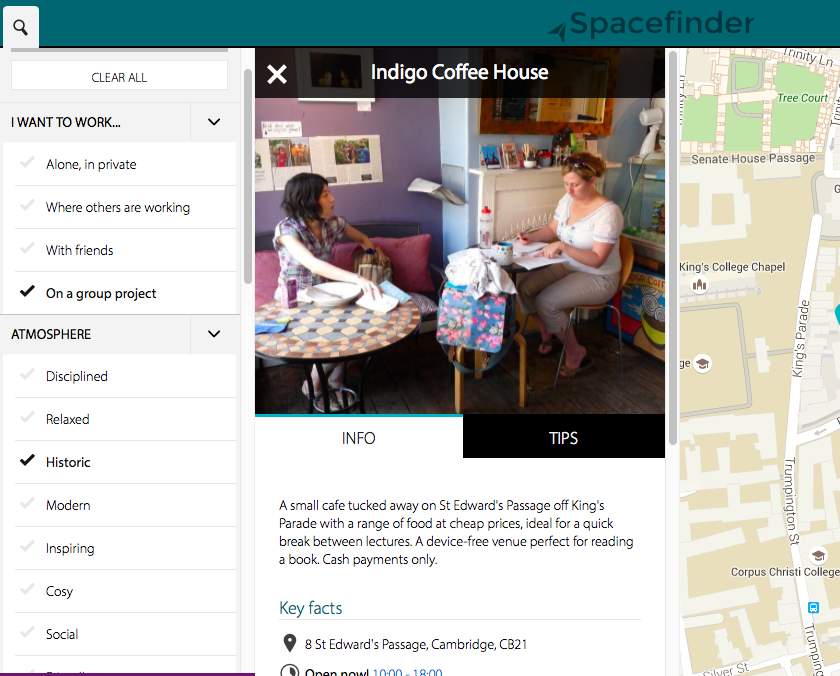
Test Filters – Prototype 1
At this stage, we were not sure about if the filter could work in our project. Therefore we chose 16 key information based on our research and evaluated each space in Shapiro and Hatcher Library.
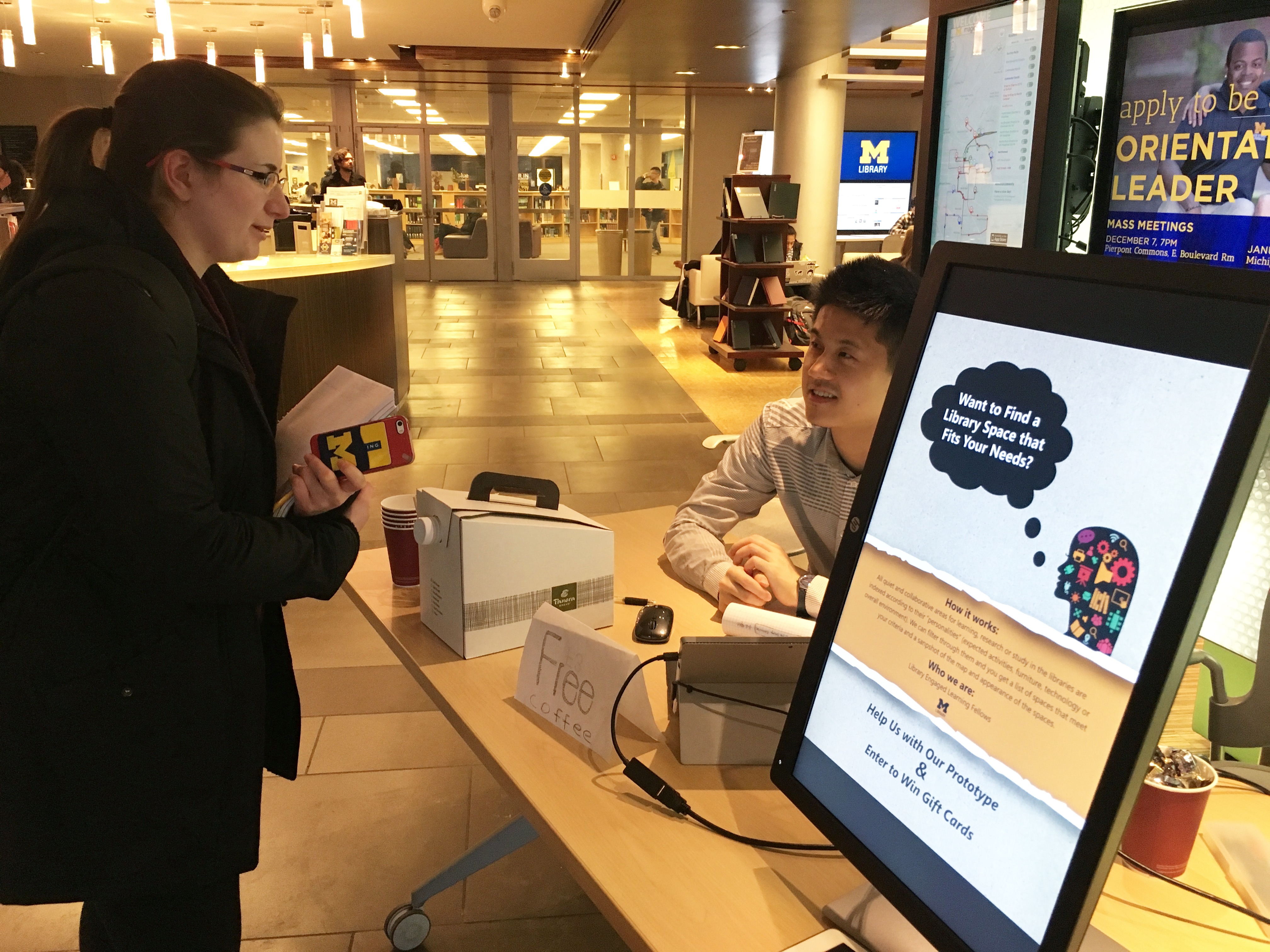
Then, we did a quick prototype using excel filters. We used 2 weeks (final-exam week and first week of new semester) to test our prototypes at the entrance of Shapiro and Hatcher Library.

We also conducted a survey with the participants of our space filters. Accoding to the data, we found that the space filter is useful and practical, but it could also include occupancy data.

Find users’ behavior patterns of finding a space or service
We conducted user interviews to gather users’ behavior patterns in finding spaces in library and their motivation behind the behavior. We were particularly interested in seeing their perceptions on existing library spaces and services.
From the analysis of interview notes, we found out some features of our behavior pattern in finding a space or service.
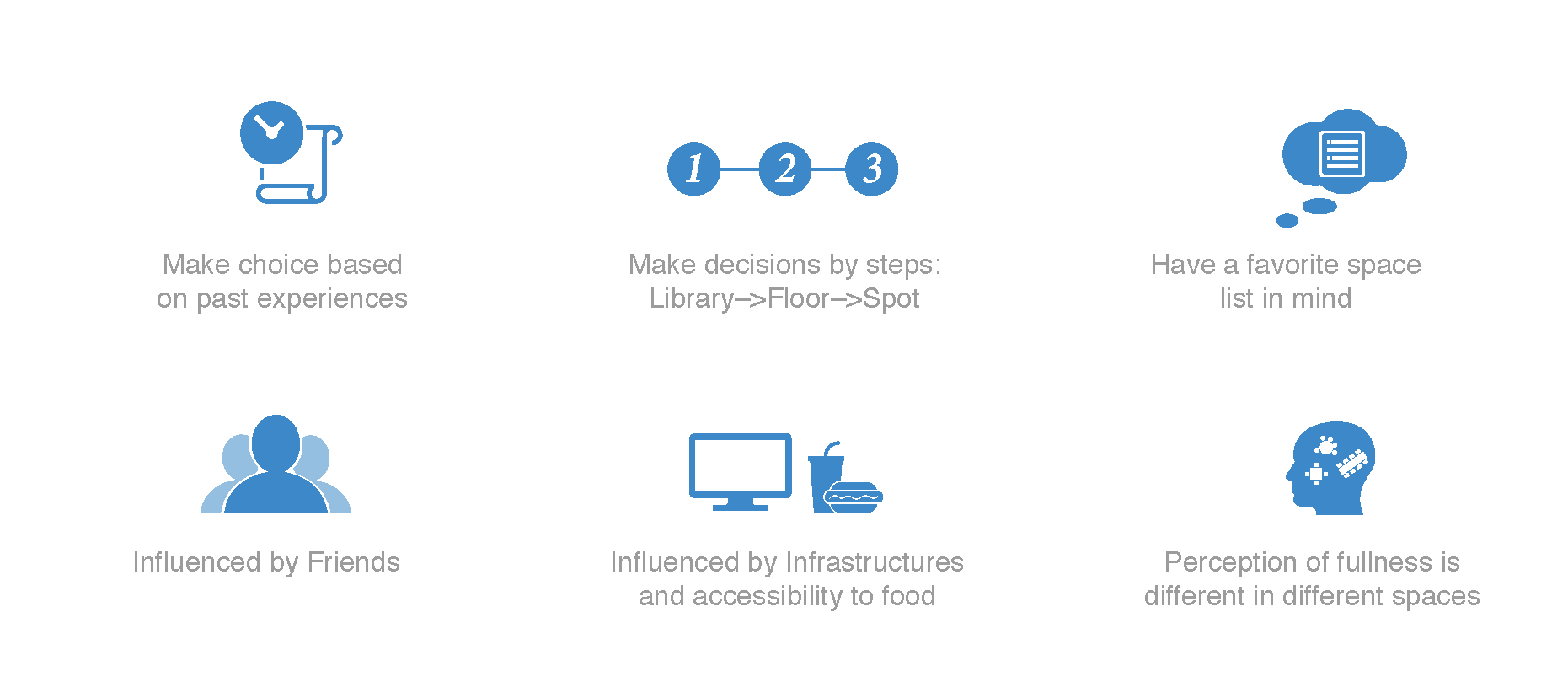
User Journey

Evaluate Feasibility
Occupancy Data Collection Tools
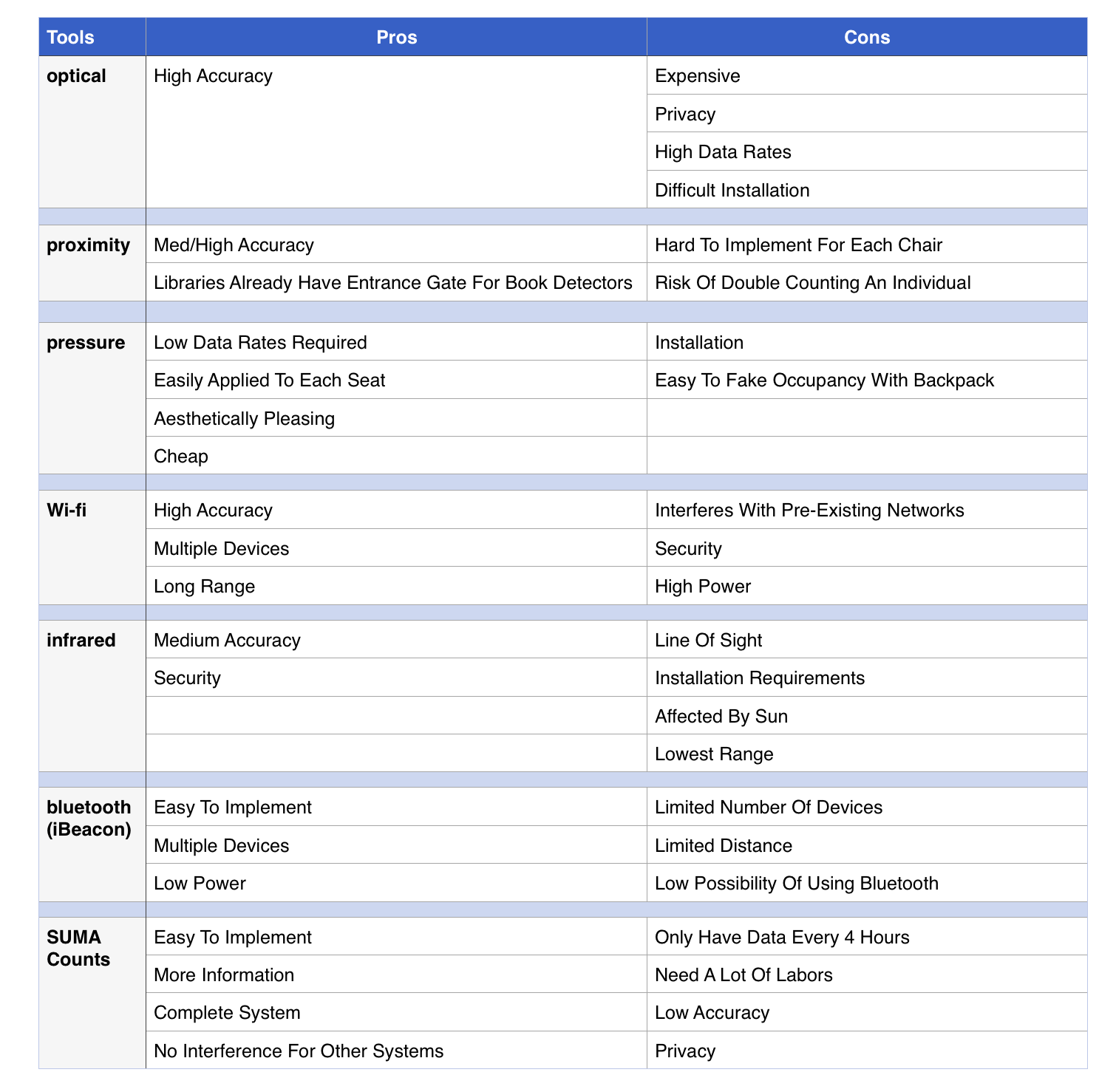
Design Iteration
Services and Space Plays (SAP Scenes)

Mike came to library for meeting with Tom but only to find out that the space is already taken. He pulls up the circle app to look for alternative spots. The app prompts him to vote on how full the space he is in right now. He chooses 100% full, hoping to help others see the space occupancy status in advance. After voting, Mike uses the space finding option within the app to locate a place he wants. It does. Mike goes over to the space shown on the app and it looks like a great spot for him and Tom. He is happy with what he finds. Later at home, Mike sees that the vote he contributes earlier has helped him reach a reward benchmark. Next time he goes to the library, he can get a free cup of Joe. He can’t wait till his next visit!
Watch Video (Story with SAP Scene)

Jane’s new assignment is a sociology paper. She has little idea on how she can cover the topics that the professor wants everyone to touch upon. Jane needs some help. Suddenly she recalls that the Library circle app boasts an academic consultation feature so she gives that a go. There is actually a number of research librarians who have sociology backgrounds. She makes an appointment with one of them. Jane comes to the consultation hub where many of librarian expertise have been made available to students. She talks with the one in sociology and receives valuable pointers on the paper she can write.
Watch Video (Story with SAP Scene)

Malin wants to go through some tutorials for her engineering class. She usually goes to the Reference room in the library. She pulls up the Circle app and sees that the reference room is unusually full at this time. However, the app also shows that there is a creative workshop on arduino circuit boards on the library 2-3 corridor. It’s very close to the reference room. Malin decides to check it out. The workshop is actually related to Malin’s major courses. Not only does she learn how to run a few simple tasks with the circuit board, she also makes acquaintance with some of the graduate students who may be big help for her later in the semester. Malin is glad that she sees the events in the library.
Watch Video (Story with SAP Scene)